weblog 2023 |
|
[home] [weblog] [science] [people] [station] [ny-ålesund] [sightings] [sitemap] [nederlands] |
|
Watering the tundra | 20 July 2023 |
Rúna Magnússon – Plant Ecology & Nature Conservation Group, Wageningen University, the Netherlands It is expected that with ongoing climate warming, rainfall patterns in Arctic environments like Svalbard will also change. For instance, heavy rainfall events in the summer will occur more often. Higher variability, and more extreme rainfall events, could affect key ecosystem properties like the thawing of permafrost soils, growth of Arctic plant species and numerous processes in the soil. That’s why in July, I visited the Dutch Arctic Station in Ny-Ålesund to work on the experiment that I am running together with Mo Verhoeven and other colleagues. In this experiment called “T-REX” (Tundra Rainfall Extremes), we add additional rainfall to tundra sites around Longyearbyen and Ny-Ålesund and track ecosystem processes over the season. And this is hard work. Of course you need a sufficient number of experimental sites per location, and “control sites” that do not receive extra water, if you want to be able to say something about the effect of rainfall and its magnitude. And each site receives an amount of water equivalent to a doubling of average summer rainfall. So, over the course of 2022 and 2023, Mo, our students and I will have moved around approximately 10,250L of water to over 80 experimental sites, using sprinklers, hoses and watering cans. 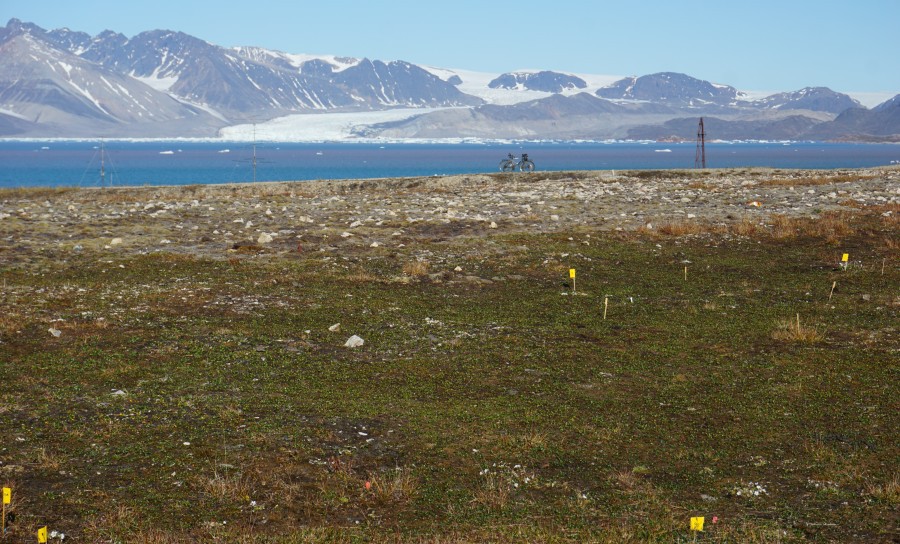 Flags mark our experimental fields close to Ny-Ålesund. We can easily reach them by bicycle. The T-REX project is a collaboration between Wageningen University and the University Centre in Svalbard, together with researchers at the Dutch Arctic Station and Stockholm University. Hopefully, the project will give us better insight into how future extreme rainfall events in the Arctic may affect permafrost degradation, plant growth, food source availability and quality for herbivores. In 2024, I plan to do a final sampling campaign to harvest polar willow shrubs from the experimental sites to study their annual growth rings and wood vessel properties in response to the rainfall treatments. Find out more about the project on “Research in Svalbard”. 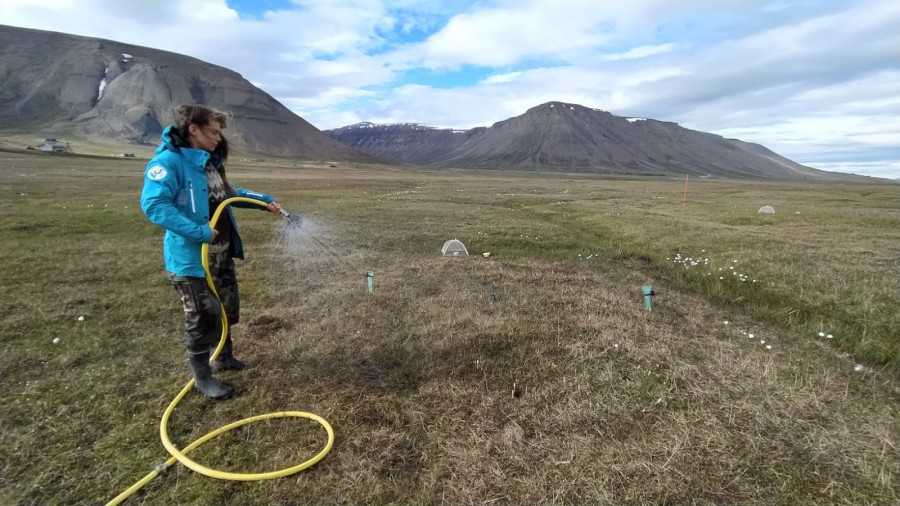 Watering an experimental site in Adventdalen. Photo by Peter Lin. Between all the measuring and watering, I am really loving life in Ny-Ålesund. Whether it is sunny or foggy, the coloured wooden houses and the ice drifting by in Kongsfjorden always look stunning. Maarten, Mo, the staff of AWIPEV and community in general made me feel very welcome. The big highlight was a trip to one of the islands in a zodiac to monitor geese. I am afraid I was fairly useless as a geese observation assistant, but hopefully slightly more succesful as a photo reporter. I am sure I will go home inspired and I am looking forward to returning if I can. If you want, you could follow my research activities on LinkedIn or check out my website with photos, artwork and research projects. 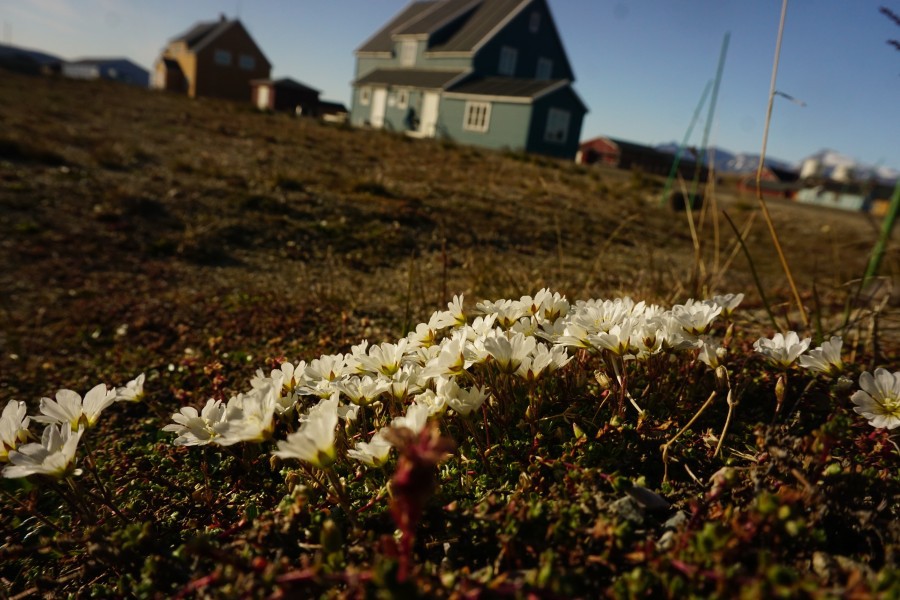 The German Koldewey Station operated by AWIPEV, where I got to stay during my visit in Ny-Ålesund 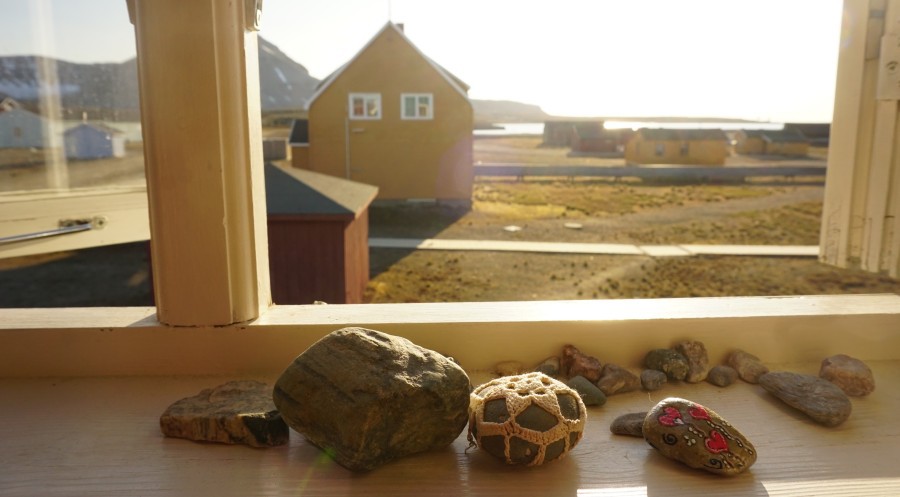 View from the German Station 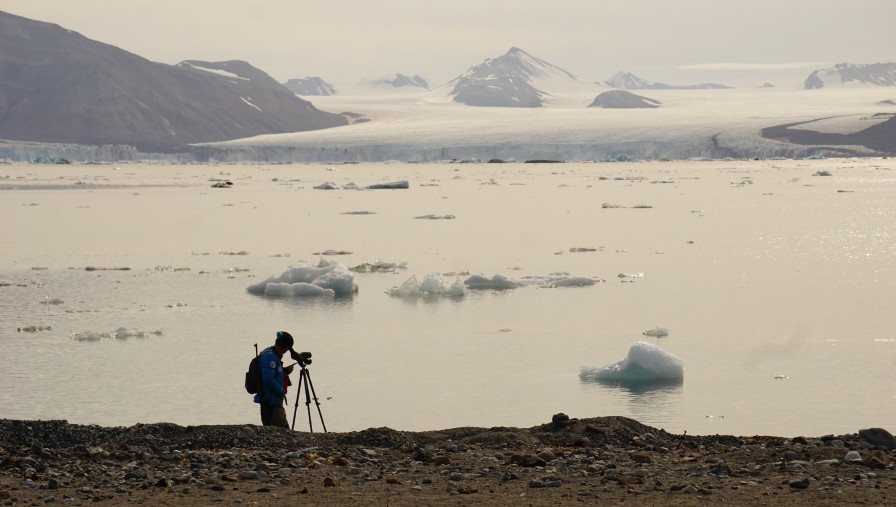 Maarten reads ring codes of ringed barnacle geese on Storholmen | |
Rúna has sent us another update on her website posts. Have a look at the following links: Pictures from Ny-Ålesund: https://runamagnusson.com/ny-alesund/ Goose adventure on Storholmen: https://runamagnusson.com/chasing-geese-on-storholmen/ Prints of birds - not only Svalbard birds: https://runamagnusson.com/birds/ Acetontransferprints, o.a. from the station, landscapes and zeppelins: https://runamagnusson.com/mirages/ Fieldblog 2023: https://runamagnusson.com/a-season-on-svalbard/ | |
[home] [weblog] [science] [people] [station] [ny-ålesund] [sightings] [sitemap] [nederlands]

|
|||||||
| [previous] | [present] | [next] | [overview] | ||||
 |
 |
 |
 |
||||
| 20230720, 13:00 | 20230720, 21:00 | 20230728, 21:51 | all items shown with small pics | ||||
| glacier collaps | Watering the tundra | polarcast.nl |
This page has been given the following keywords: [plants] [permafrost] [global warming] You can click on each keyword to get an overview about related pages. |